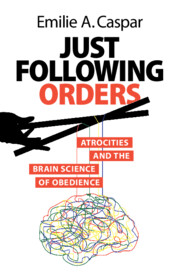Book contents
- Just Following Orders
- Just Following Orders
- Copyright page
- Contents
- Figures
- Preface
- Acknowledgments
- Introduction: Understanding Genocide as a Means to Prevention
- Chapter 1 Listening to the Perpetrators of Genocide
- Chapter 2 A Brief History of the Experimental Research on Obedience
- Chapter 3 How Do We Take Ownership over and Responsibility for Our Own Actions?
- Chapter 4 Moral Emotions under Obedience
- Chapter 5 Just Giving Orders? In the Brains of Those Who Command
- Chapter 6 Desolation Is Everywhere
- Chapter 7 Conclusion: How Ordinary People Stand Up against Immorality
- Epilogue: A Hopeful Horizon
- References
- Index
Chapter 5 - Just Giving Orders? In the Brains of Those Who Command
Published online by Cambridge University Press: 25 July 2024
- Just Following Orders
- Just Following Orders
- Copyright page
- Contents
- Figures
- Preface
- Acknowledgments
- Introduction: Understanding Genocide as a Means to Prevention
- Chapter 1 Listening to the Perpetrators of Genocide
- Chapter 2 A Brief History of the Experimental Research on Obedience
- Chapter 3 How Do We Take Ownership over and Responsibility for Our Own Actions?
- Chapter 4 Moral Emotions under Obedience
- Chapter 5 Just Giving Orders? In the Brains of Those Who Command
- Chapter 6 Desolation Is Everywhere
- Chapter 7 Conclusion: How Ordinary People Stand Up against Immorality
- Epilogue: A Hopeful Horizon
- References
- Index
Summary
Hierarchical situations are a complex example for determining individual responsibility, as typically a superior communicates a plan, and a subordinate executes it. Thus, the superior bears responsibility for the decision but is distanced from the outcomes, while the subordinate experiences authorship over the action but may not experience responsibility for its outcomes. This chapter focuses on how authority is wielded and how decisions are made by commanders in order to understanding the dynamics of obedience. By reviewing the claims made by some leaders of genocide, this chapters show that despite their high position in the hierarchical chain, they are frequently trying to reduce their responsibility for the atrocities conducted. Neuroscience research further showed that giving orders leads to a reduction of the sense of agency and moral emotions towards the pain of victims. These results show how hierarchical situations can allow people to commit actions that could transgress moral conducts, as agency and moral emotions are split across two individuals.
- Type
- Chapter
- Information
- Just Following OrdersAtrocities and the Brain Science of Obedience, pp. 147 - 167Publisher: Cambridge University PressPrint publication year: 2024

